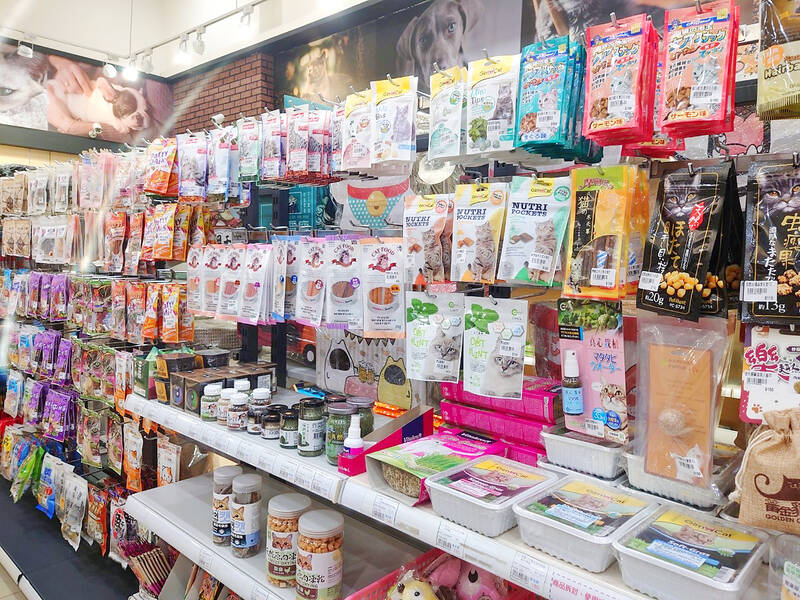The nation’s exports of pet food last year rose 44 percent from 2021 to a record 1,922 tonnes, the Council of Agriculture has said.
The value of dog and cat food exports reached US$17.66 million, compared with US$12.2 million in 2021 and increasing 377 percent from 2016.
Pet food can be categorized into daily meals and nutritional supplements, Department of Animal Industry Deputy Director Chiang Wen-chuan (江文全) said.

Photo courtesy of the New Taipei City Animal Protection and Health Inspection Office
Taiwan generally relies on imports to meet demand for dog and cat food, but the diverse supplement market is becoming a focus for domestic producers, Chiang said.
Domestic consumers prefer locally made products for functional pet foods, which contain added supplements, he said.
The segment has become local producers’ most successful export item, making significant inroads into Hong Kong, Malaysia, the Philippines, South Korea and elsewhere, he added.
Supplements include treats, dental bones and functional foods for aging pets, Chiang said.
Domestic producers make them out of animal byproducts, ensuring that nothing goes to waste, he added.
A long-time dog owner surnamed Cho (卓) said they always choose local products, as they are cheaper and of higher quality than imports.
Cho added that many of their fellow dog owners do not have children, so they have more money to spend on their pets, especially on nutritional supplements that could improve their health.
Meanwhile, a biennial council survey showed that pet ownership has declined in the past few years.
In 2021, there were 2.1 million pet dogs and cats in Taiwan, down from 2.51 million in 2017.
The overall decline was due to falling dog ownership, with the number of pet dogs falling from 1.78 million in 2017 to 1.24 million in 2021.
The number of pet cats increased over the period from 733,000 to 870,000.
The changing trend is likely due to lifestyle, as dogs require more space and attention than cats, Chiang said.
As dogs also tend to be noisier and more active, they can cause issues with neighbors or housemates living in small apartment buildings, he added.
As opposed to dog owners who typically only raise one animal, cat owners often have multiple felines, Chiang said.
Cats also do well in vertical spaces, meaning they are easier to keep in small apartments, he said.
The survey also shows a trend toward ownership of more unusual pets, such as reptiles or insects, he added.

The manufacture of the remaining 28 M1A2T Abrams tanks Taiwan purchased from the US has recently been completed, and they are expected to be delivered within the next one to two months, a source said yesterday. The Ministry of National Defense is arranging cargo ships to transport the tanks to Taiwan as soon as possible, said the source, who is familiar with the matter. The estimated arrival time ranges from late this month to early next month, the source said. The 28 Abrams tanks make up the third and final batch of a total of 108 tanks, valued at about NT$40.5 billion

A group from the Taiwanese Designers in Australia association yesterday represented Taiwan at the Midsumma Pride March in Melbourne. The march, held in the St. Kilda suburb, is the city’s largest LGBTQIA+ parade and the flagship event of the annual Midsumma Festival. It attracted more than 45,000 spectators who supported the 400 groups and 10,000 marchers that participated this year, the association said. Taiwanese Designers said they organized a team to march for Taiwan this year, joining politicians, government agencies, professionals and community organizations in showing support for LGBTQIA+ people and diverse communities. As the first country in Asia to legalize same-sex

Travel agencies in Taiwan are working to secure alternative flights for travelers bound for New Zealand for the Lunar New Year holiday, as Air New Zealand workers are set to strike next week. The airline said that it has confirmed that the planned industrial action by its international wide-body cabin crew would go ahead on Thursday and Friday next week. While the Auckland-based carrier pledged to take reasonable measures to mitigate the impact of the workers’ strike, an Air New Zealand flight arriving at Taipei from Auckland on Thursday and another flight departing from Taipei for Auckland on Saturday would have to

MOTIVES QUESTIONED The PLA considers Xi’s policies toward Taiwan to be driven by personal considerations rather than military assessment, the Epoch Times reports Chinese President Xi Jinping’s (習近平) latest purge of the Chinese People’s Liberation Army (PLA) leadership might have been prompted by the military’s opposition to plans of invading Taiwan, the Epoch Times said. The Chinese military opposes waging war against Taiwan by a large consensus, putting it at odds with Xi’s vision, the Falun Gong-affiliated daily said in a report on Thursday, citing anonymous sources with insight into the PLA’s inner workings. The opposition is not the opinion of a few generals, but a widely shared view among the PLA cadre, the Epoch Times cited them as saying. “Chinese forces know full well that